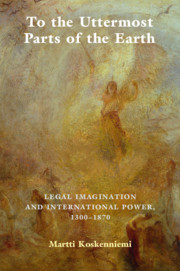Book contents
- To the Uttermost Parts of the Earth
- To the Uttermost Parts of the Earth
- Copyright page
- Dedication
- Contents
- Acknowledgements
- Introduction
- Part I Towards the Rule of Law
- Part II France: Law, Sovereignty and Revolution
- Part III Britain: Laws and Markets
- Part IV Germany: Law, Government, Freedom
- 11 A Science of State-Machines
- 12 The End of Natural Law
- Conclusion and Epilogue
- Bibliography
- Index
12 - The End of Natural Law
German Freedom 1734–1821
from Part IV - Germany: Law, Government, Freedom
Published online by Cambridge University Press: 05 August 2021
- To the Uttermost Parts of the Earth
- To the Uttermost Parts of the Earth
- Copyright page
- Dedication
- Contents
- Acknowledgements
- Introduction
- Part I Towards the Rule of Law
- Part II France: Law, Sovereignty and Revolution
- Part III Britain: Laws and Markets
- Part IV Germany: Law, Government, Freedom
- 11 A Science of State-Machines
- 12 The End of Natural Law
- Conclusion and Epilogue
- Bibliography
- Index
Summary
Having found a way to justify a world of state-machines, German lawyers thought about how to manage those machines so as to produce "happiness", which would eventually be understood to include the freedom of the nation and its members. At the University of Göttingen from 1734 onwards ius naturae et gentium eventually produced four specialised idioms: empirical state-science, economics, philosophy and modern law of nations, each opening a distinct way to address an increasingly international world. Among legal professionals, the view of the law of nations as the formalisation of European diplomacy became generally accepted. But the most influential aspect of the German debates concerned the role of the state in realising freedom in conditions of political modernity. Individual rights were to be reconciled with the flourishing of the nation; the state was to adopt its historically appropriate position in relationship to expanding bourgeois civil society. The search for a new vocabulary to address such features of modernity persuaded international lawyers finally to settle on “civilisation”, as will be briefly noted in the Epilogue.
Keywords
- Type
- Chapter
- Information
- To the Uttermost Parts of the EarthLegal Imagination and International Power 1300–1870, pp. 873 - 951Publisher: Cambridge University PressPrint publication year: 2021

